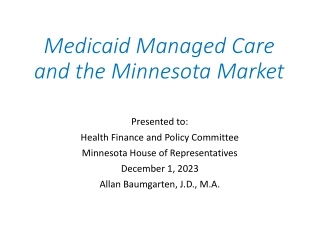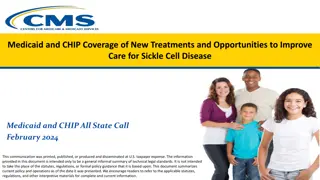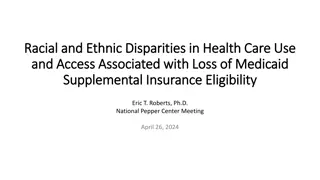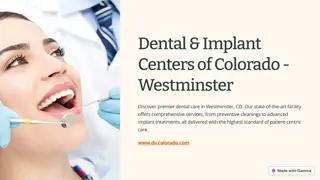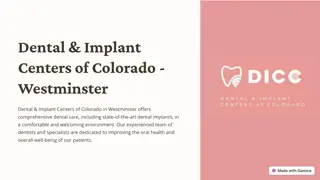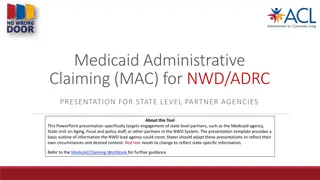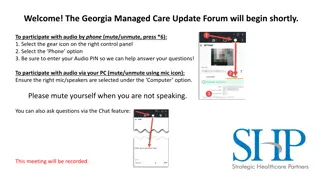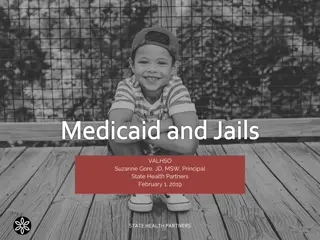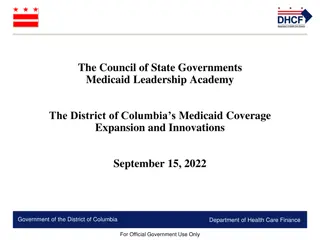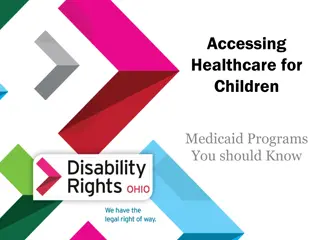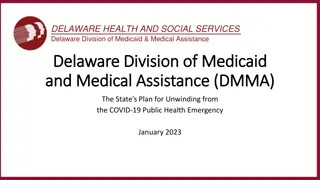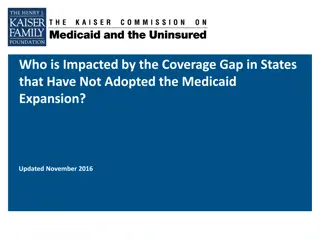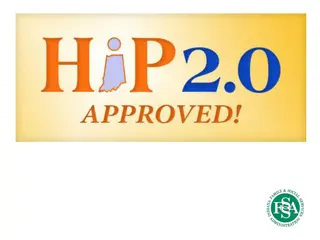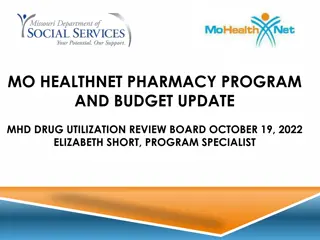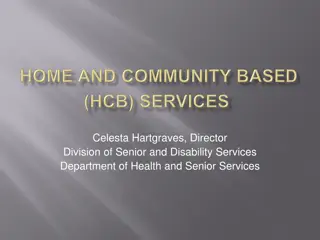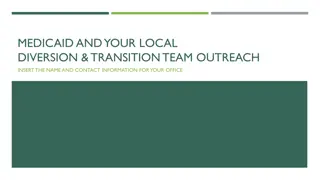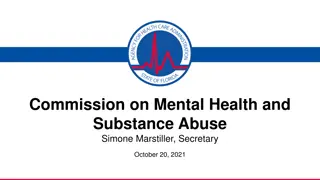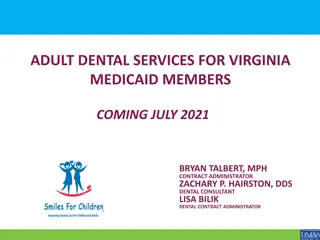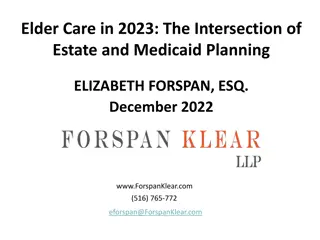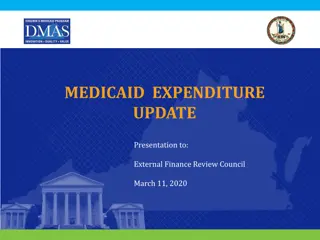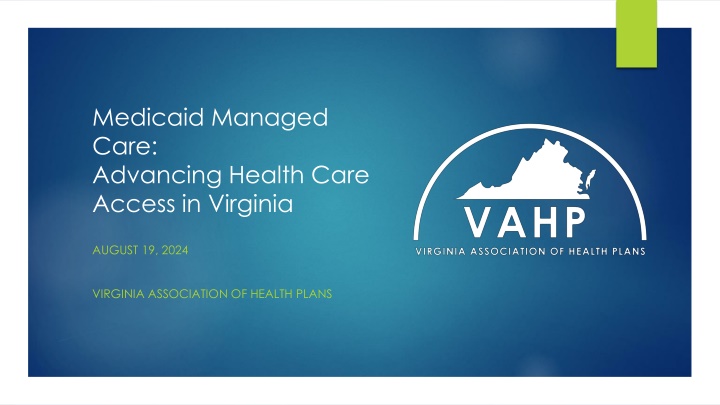
Improving Access to Quality Care with Virginia's Medicaid Managed Care Organizations
Discover how Virginia's 5 Medicaid Managed Care Organizations (MCOs) are providing coverage to over 95% of Medicaid members, offering services across various eligibility categories like infants, pregnant individuals, and those with disabilities. Learn how Medicaid Managed Care advances health care access by increasing primary care utilization, supporting preventive care, and addressing health-related social needs through community engagement and advocacy.
Download Presentation

Please find below an Image/Link to download the presentation.
The content on the website is provided AS IS for your information and personal use only. It may not be sold, licensed, or shared on other websites without obtaining consent from the author. If you encounter any issues during the download, it is possible that the publisher has removed the file from their server.
You are allowed to download the files provided on this website for personal or commercial use, subject to the condition that they are used lawfully. All files are the property of their respective owners.
The content on the website is provided AS IS for your information and personal use only. It may not be sold, licensed, or shared on other websites without obtaining consent from the author.
E N D
Presentation Transcript
Medicaid Managed Care: Advancing Health Care Access in Virginia AUGUST 19, 2024 VIRGINIA ASSOCIATION OF HEALTH PLANS
Virginias Medicaid Managed Care Organizations (MCOs) There are 5 MCOs providing coverage to nearly 2 million Medicaid enrollees or over 95% of Medicaid members
Medicaid MCOs in Virginia MCOs provide coverage across all eligibility categories: Infants and children Pregnant individuals Caretaker adults Low-income adults Older adults Individuals and children with disabilities Dual eligibles (individuals with both Medicare and Medicaid)
What is Medicaid Managed Care? Medicaid Managed Care helps fill gaps in access to quality care by: Increasing primary care utilization Supporting access to prenatal and perinatal care Prioritizing preventive care and promoting healthy lifestyles Coordinating physician and behavioral health Providing timely access to appointments and services Ensuring robust provider networks Advancing value-based care MCOs save and improve lives working within our communities and with individual members, through: Home visiting Health risk assessments Member advocacy Early intervention Education & health literacy Community engagement Addressing Health Related Social Needs
Health-Related Social Needs (HRSNs) An individual s social determinants of health and associated HRSNs can account for as much as 50% of health outcomes1 When HRSNs are unmet, they can drive lapses in coverage and access to care and perpetuate health inequities MCOs work to address these needs as part of their contractual obligations, e.g. Connecting unhoused individuals with housing Assisting with food access MCOs work with local, Community-Based Organizations to address needs and connect individuals with their community 1. Addressing Social Determinants of Health: Examples of Successful Evidence-Based Strategies and Current Federal Efforts | ASPE (hhs.gov)
Addressing HRSNs UNITEDHEALTHCARE HOUSING + HEALTH | UNITEDHEALTHCARE COMMUNITY & STATE (UHCCOMMUNITYANDSTATE.COM)
MCOs Incentives for Quality Care DMAS requires MCOs to participate in Performance Withhold Program (PWP) and Clinical Efficiency Programs PWP or quality withhold measures MCO performance across 10 domains, e.g.: Prenatal care access, diabetes care, SUD engagement Clinical Efficiencies requires reducing preventable, avoidable, and/or medically unnecessary utilization Potentially Preventable Admissions Potentially Preventable, Avoidable, and/or Medically Unnecessary ED Visits Acute Inpatient 30-day readmissions FY24 Estimated Medallion 4.0 $32M CCC+ $66M
Fiscal Accountability Drives Health Outcomes Monthly MCO capitated payment is based on annual actuarial analysis Generally, assumes a profit of 1.0% The Medical Loss Ratio (MLR) protects the Commonwealth from paying excessive health plan administrative fees Current MLR requires at least 85% of payments on medical claims A Profit Cap provides that if actual MCO profit exceeds 3%, the Commonwealth receives a repayment of the excess profits on a sliding scale In addition, the MCOs contribute more than $300 million in Pharmacy Rebates annually that are returned to the Commonwealth
MCOs Provide Fiscal Predictability and Sustainability to the Commonwealth The Medicaid MCOs incur the costs and the risks of paying for individual s care Using provider payment rates set by the Commonwealth MCO Earnings are generated through: 1% State Expected Profit Affordability Cost Management The MLR and Profit Cap provide guardrails
Challenges Addressing HRSNs for many Medicaid enrollees is the difference between satisfactory short-term outcomes and long-term stability and wellness We can do more with more flexibility to reinvest dollars Maternal Health Community Behavioral Health Sustaining Primary Care Access Member Engagement/Access to Information New & Evolving Financial Pressures
For More Information: Questions? HEIDI DIX, SVP OF POLICY, HEIDI@VAHP.ORG DOUG GRAY, EXECUTIVE DIRECTOR, DGRAY@VAHP.ORG

